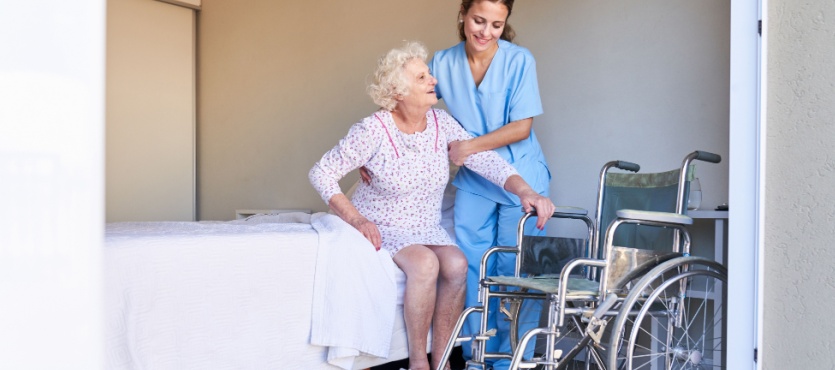Decubitus ulcers, commonly known as bedsores or pressure ulcers, are serious skin and tissue injuries that result from prolonged pressure on the skin. They often affect individuals who are bedridden, use a wheelchair, or have limited mobility. Recognizing the importance of understanding, preventing, and managing these painful and potentially dangerous wounds is crucial for maintaining the health and comfort of at-risk individuals.
What Are Decubitus Ulcers?
Decubitus ulcers are injuries to the skin and underlying tissue caused by sustained pressure, friction, or shear. They typically develop on bony areas of the body such as the heels, ankles, hips, and tailbone. Prolonged pressure in these areas impedes blood flow, leading to tissue damage and ulcer formation.
How Do They Form?
Causes of Decubitus Ulcers: Prolonged pressure on one area of the body can compress blood vessels, reducing blood flow to tissues and causing cells to die. Friction from rubbing against clothing, bedding, or other surfaces can damage the skin and make it more susceptible to ulcers. Additionally, shear occurs when the skin moves in one direction while the underlying bone moves in another, stretching and tearing blood vessels, which can lead to tissue damage.
Risk Factors: Several factors increase the risk of developing decubitus ulcers, including immobility due to illness, injury, or sedation. Poor nutrition and hydration, medical conditions affecting blood flow such as diabetes and vascular disease, advanced age, and incontinence also contribute to the likelihood of ulcer formation.
Stages of Decubitus Ulcers
Decubitus ulcers are classified into four stages based on the severity of tissue damage:
Stage 1: The skin is intact but shows signs of redness that do not blanch (turn white) when pressed. Symptoms include pain, tenderness, and possible warmth or coolness compared to surrounding skin. Treatment involves relieving pressure, keeping the area clean and dry, and using moisture barriers.
Stage 2: The skin breaks open, forming a shallow ulcer or blister. Symptoms include pain, swelling, and redness. The wound may ooze clear fluid or pus. Treatment includes cleaning the wound with saline, applying a protective dressing, and avoiding further pressure on the area.
Stage 3: The ulcer extends into the underlying fat layer, forming a deep crater. Symptoms include increased pain, redness, and swelling. The wound may produce a foul odor if infected. Treatment involves removing dead tissue (debridement), using specialized dressings, and possibly antibiotics if infection is present.
Stage 4: The ulcer reaches muscle or bone, causing extensive damage. Symptoms include severe pain, large wounds with dead tissue, and potential signs of systemic infection (fever, chills). Treatment includes aggressive wound care, including debridement, specialized dressings, and surgical intervention if necessary.
Prevention of Decubitus Ulcers
Preventing decubitus ulcers involves several key strategies aimed at reducing pressure, improving skin care, and ensuring proper nutrition:
Regular repositioning of patients is crucial to relieve pressure and prevent ulcer formation. Use pillows or foam wedges to keep bony areas from direct contact with surfaces. Keeping the skin clean and dry, using moisture barriers, and inspecting the skin daily for signs of pressure damage are essential steps in skin care. Utilizing specialized mattresses, mattress overlays, and cushions designed to reduce pressure can significantly help in prevention.
Ensuring a well-balanced diet rich in protein, vitamins, and minerals is important for maintaining healthy skin and tissue. Adequate hydration is equally crucial, as dehydrated skin is more prone to breakdown and less able to recover from minor injuries. Educating patients, caregivers, and family members on the importance of pressure ulcer prevention, proper techniques for repositioning, skin care routines, and the use of assistive devices can greatly reduce the incidence of decubitus ulcers.
Ensuring Optimal Health and Well-Being
Decubitus ulcers are a serious concern for homebound patients, but with proper understanding, prevention, and management, their impact can be significantly reduced. At All About You Home Health, we are dedicated to providing the care and support needed to prevent or treat these ulcers, ensuring the comfort and well-being of our patients. If you or a loved one are at risk for decubitus ulcers, contact us today to learn more about our services and how we can help. For more information, please visit our contact page.
For more insights on rehabilitation and mobility support, explore our related post: Understanding the Role of Physical Therapy in Home Health Care
If you’re looking for a reliable Personal Care Assistant in Florida, All About You Home Health provides dedicated support to help patients stay safe, comfortable, and independent at home.

